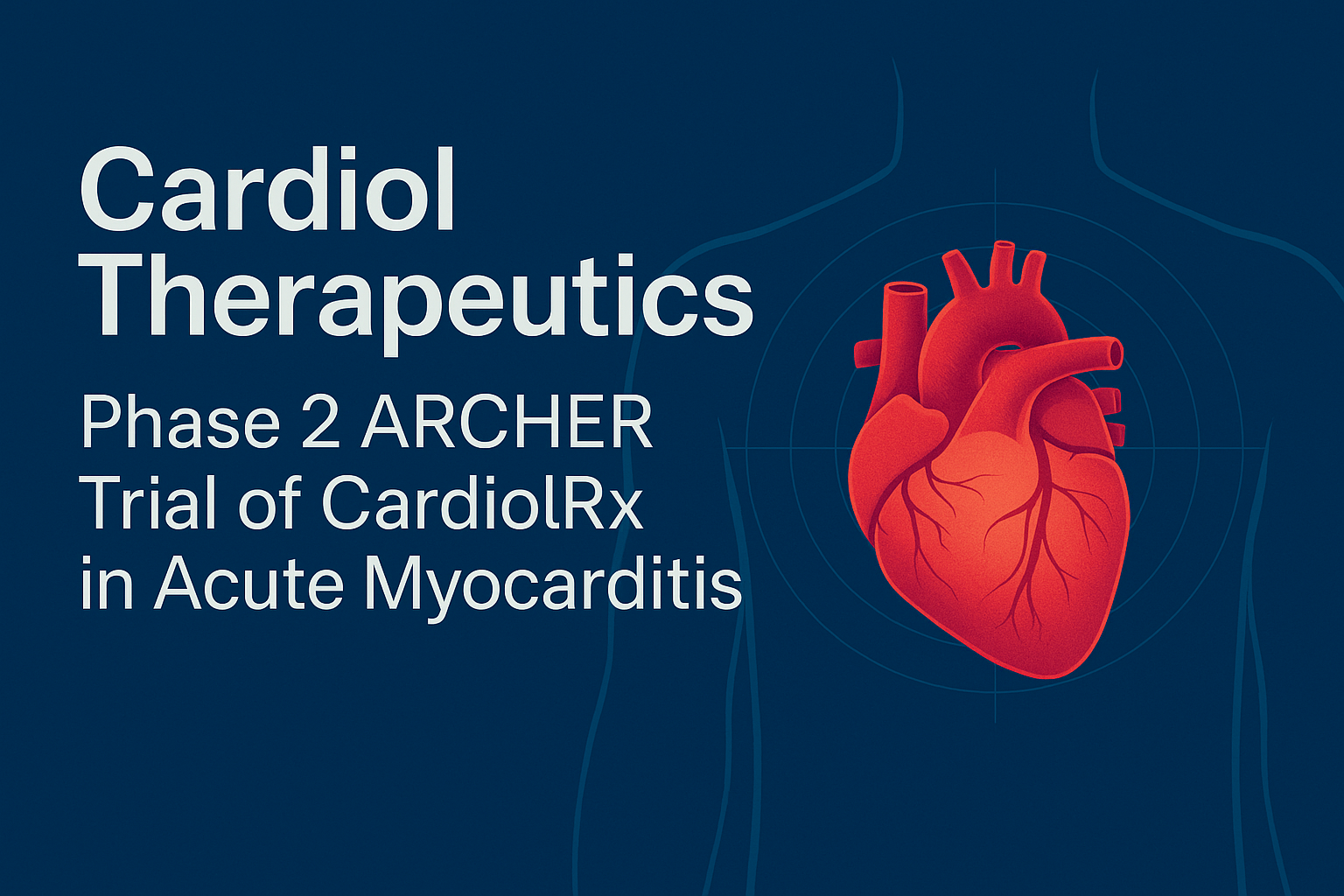Key Highlights:
- Positive MRI Outcomes: In the Phase II ARCHER trial, CardiolRx™ (an oral cannabidiol formulation) showed a trend toward improvement in cardiac extracellular volume (ECV) – a marker of fibrosis – compared to placebo, along with a significant reduction in left ventricular (LV) mass. While global longitudinal strain (GLS, a measure of heart function) did not significantly differ, multiple cardiac MRI endpoints favored CardiolRx.
- Safety and Tolerability: CardiolRx was well-tolerated with an excellent safety profile. No serious safety signals emerged, reinforcing confidence in this anti-inflammatory approach to heart disease.
- First-of-its-Kind Result: ARCHER is the first clinical trial to demonstrate structural and cardiac remodeling improvements in myocarditis patients. The data validate Cardiol’s anti-fibrotic strategy, marking the second positive proof-of-concept trial for the company’s pipeline.
- Strategic Implications: The results support advancing CardiolRx into later-stage development for acute myocarditis and bolster the rationale for Cardiol’s broader platform targeting cardiac inflammation. Cardiol intends to seek an FDA Orphan Drug Designation for CardiolRx in acute myocarditis, potentially securing market exclusivity and regulatory incentives.
ARCHER Phase II Trial Design and Topline Results
Cardiol Therapeutics’ ARCHER trial was a multi-national, randomized, double-blind, placebo-controlled Phase II study evaluating CardiolRx in acute myocarditis. The trial enrolled 109 adult patients across 34 leading cardiac centers in the United States, Canada, Europe, Latin America, and Israel. Participants had clinically confirmed acute myocarditis and were randomized to receive CardiolRx (a pharmaceutically manufactured cannabidiol oral solution) or placebo for 12 weeks. The study’s primary efficacy endpoints were changes in extracellular volume (ECV) and global longitudinal strain (GLS) on cardiac magnetic resonance imaging (MRI) after 12 weeks.
Topline findings announced in August 2025 showed that CardiolRx therapy led to meaningful improvements in cardiac structure. Notably, patients on CardiolRx exhibited a greater reduction in ECV compared to placebo. This reduction in ECV was accompanied by improvements across multiple pre-specified MRI endpoints, including a statistically significant decrease in left ventricular mass – an encouraging sign, as elevated LV mass is linked to worse outcomes in heart disease. GLS did not change significantly versus placebo, which the company noted may reflect that many patients had preserved pump function at baseline.
Crucially, CardiolRx demonstrated a strong safety and tolerability profile. No major adverse differences were observed between the CardiolRx and placebo groups. This mirrors findings from Cardiol’s prior Phase II trial in recurrent pericarditis, reinforcing that cannabidiol-based therapy can be delivered safely in inflammatory heart conditions. The absence of safety concerns is a vital de-risking factor for investors.
“These intriguing findings reinforce our original hypothesis that pharmaceutically manufactured cannabidiol can attenuate myocardial inflammation and edema,” said Dr. Leslie Cooper, co-chair of the ARCHER Steering Committee. The company has submitted the ARCHER results for presentation at an upcoming scientific meeting and for publication in a peer-reviewed journal, signaling confidence in the robustness of the data.
Acute Myocarditis: A High-Risk Cardiac Condition with No Approved Therapies
The target disease in ARCHER, acute myocarditis, is an inflammatory condition of the heart muscle often triggered by viral infections, but it can also arise from bacterial infections, certain cancer therapies, and even as a rare mRNA vaccine complication. Patients typically present with chest pain, shortness of breath, fatigue, arrhythmias, or fainting spells. The clinical course ranges from mild symptoms to severe cases of heart failure, dangerous arrhythmias, or cardiogenic shock. Myocarditis is a leading cause of acute and fulminant heart failure in young adults and a top cause of sudden cardiac death in people under 35. In some patients, the damage progresses to chronic dilated cardiomyopathy, a condition that can necessitate heart transplantation.
Despite its severity, acute myocarditis remains a therapeutic orphan. There are no FDA- or EMA-approved drug therapies specifically indicated for acute myocarditis. Treatment today is mainly supportive – managing heart failure symptoms with conventional drugs and addressing complications like arrhythmias – but nothing targets the underlying inflammatory injury. For patients and healthcare systems, the burden is significant: those hospitalized with myocarditis face a 4–6% risk of dying during that admission. Epidemiologically, myocarditis is relatively rare but not negligible – with roughly 73,000 myocarditis cases per year in the U.S. The median age of diagnosis is only 37, meaning this condition often strikes otherwise healthy young adults in their prime.
The lack of approved therapy and the acute, life-threatening nature of myocarditis underscore a major unmet medical need. Any new therapy that can improve cardiac healing or outcomes in myocarditis would address a void in cardiology practice.
Why ARCHER’s Results Matter for Cardiol and Investors
For Cardiol Therapeutics and its stakeholders, the ARCHER trial’s positive outcome is significant on multiple fronts. Firstly, the data provide compelling clinical proof-of-concept for CardiolRx in inflammatory heart disease. This marks Cardiol’s second successful trial outcome, thereby validating the company’s platform approach of targeting cardiac inflammation and fibrosis. Demonstrating that CardiolRx can favorably remodel the myocardium in acute inflammation suggests broader applicability – it strongly supports advancing the clinical development of CardiolRx and CRD-38 in cardiomyopathies, heart failure, and myocarditis.
Secondly, the ARCHER findings open the door for regulatory and commercial advantages via Orphan Drug Designation (ODD). Acute myocarditis qualifies as a rare disease, and Cardiol has signaled its intent to pursue orphan status for CardiolRx in this indication. The U.S. Orphan Drug program offers key incentives for drug developers, including seven-year market exclusivity upon approval, exemption from certain FDA fees, and tax credits for clinical research. Orphan status often also brings increased support and the possibility of accelerated regulatory review for promising therapies in dire need. Cardiol notes that the orphan route was successfully utilized to achieve the first FDA approval of a cannabidiol-based medicine for rare pediatric epilepsy and believes a similar opportunity exists to develop CardiolRx as an orphan drug for acute myocarditis.
Thirdly, being first-to-market in acute myocarditis carries significant commercial allure despite the indication’s rarity. If CardiolRx ultimately becomes the inaugural approved therapy for this condition, it could enjoy a de facto monopoly in treating patients who today have no dedicated options. Even with tens of thousands of cases annually in the U.S., an effective therapy could command premium pricing given the severe outcomes and high hospitalization costs associated with myocarditis. Payers may be willing to support a costly drug if it demonstrably reduces ICU stays, transplant needs, or mortality. Moreover, positive structural outcomes like reductions in LV mass are noteworthy because they draw parallels to existing blockbuster cardiovascular drugs – for example, leading heart failure medications that reduce LV mass and have been shown to cut mortality and hospitalizations. The fact that CardiolRx produced a significant drop in LV mass over just 12 weeks hints at potential long-term benefits in cardiac function and patient prognosis.
Finally, the ARCHER trial success enhances Cardiol’s strategic position in the biotech landscape. The company has already secured FDA Orphan Drug Designation for CardiolRx in pericarditis and is conducting a pivotal Phase III trial (MAVERIC) in recurrent pericarditis. Positive myocarditis data adds momentum and could make Cardiol a more attractive partner or acquisition target for larger pharmaceutical players interested in cardiology. Management has indicated that alongside advancing its clinical programs, it is engaging in strategic partnering discussions to support further development and commercialization. The dual success in pericarditis and myocarditis gives Cardiol greater leverage in those conversations. With a cash runway projected through Q3 2027 to support these initiatives, Cardiol is well-positioned to negotiate from strength or to continue independently through key upcoming milestones.
Broader Context: Cardiol’s Inflammation-Focused Pipeline and Next Steps
The ARCHER trial is one piece of Cardiol’s broader strategy to develop treatments for inflammatory heart diseases. CardiolRx, the company’s lead candidate, is a ultra-pure formulation of cannabidiol (CBD) designed for cardiovascular use. CBD is known to inhibit the inflammasome pathway – a driver of inflammation and fibrosis – implicating conditions like myocarditis, pericarditis, and heart failure. The encouraging results in acute myocarditis complement the evidence from recurrent pericarditis, where Cardiol’s Phase II pilot (MAvERIC) showed rapid and durable relief from pericarditis chest pain. Building on that, Cardiol has an ongoing Phase III MAVERIC trial in recurrent pericarditis, which is a randomized, placebo-controlled study aiming to confirm CardiolRx’s efficacy in reducing pericarditis recurrence and symptoms.
In parallel, Cardiol is advancing CRD-38, a novel subcutaneous drug candidate targeting heart failure. Heart failure remains a massive market with over 1 million hospitalizations annually in the U.S. and no current therapies addressing the inflammatory and fibrotic components of the disease. CRD-38 is in IND-enabling stages, and the company aims to bring it into clinical trials as a potential treatment for heart failure with preserved ejection fraction (HFpEF), a form of heart failure with huge unmet need. The rationale for CRD-38 is similar: modulating inflammation to prevent adverse cardiac remodeling. The successful outcome of ARCHER in myocarditis – essentially an acute, localized inflammatory heart injury – provides extra validation for targeting inflammation in the broader heart failure context.
Looking ahead, Cardiol Therapeutics plans to present the full ARCHER trial data at a scientific conference in late 2025 and publish the results in a peer-reviewed journal. These events could further elucidate details and garner interest from the cardiology community. In the meantime, the company will likely engage with the FDA on next steps, potentially designing a Phase III trial in acute myocarditis if the agency agrees on meaningful endpoints. Given the lack of existing treatments, it’s conceivable that regulators might be amenable to an accelerated development path, especially with Orphan Drug status in play.
From a commercial perspective, CardiolRx’s trajectory in acute myocarditis could mirror other recent orphan cardiology drugs: start in a narrow high-need population, then expand labels or usage over time. One area of expansion mentioned by researchers is myocarditis induced by cancer immunotherapies, a small but critical subgroup with high mortality. A therapy that can modulate myocardial inflammation could find utility there as well. Additionally, if CardiolRx proves to favorably remodel the heart after inflammation, it might have preventive or chronic therapeutic roles following acute myocarditis to stave off progression to heart failure. These longer-term considerations point to a platform potential – the idea that Cardiol’s anti-inflammatory approach could be applied across multiple cardiac conditions driven by inflammation and fibrosis.
Conclusion
For retail investors following Cardiol Therapeutics (NASDAQ: CRDL), the Phase II ARCHER trial results represent a pivotal validation of the company’s vision. The trial demonstrated that CardiolRx can produce tangible improvements in heart structure in a disease with no current treatments, highlighting a significant unmet medical need and a clear clinical opportunity. Beyond the science, the outcome strengthens Cardiol’s case for Orphan Drug benefits, supports its ongoing recurrent pericarditis Phase III program, and adds momentum to its emerging heart failure program. In a biotech market that often hinges on unique niche successes, Cardiol now has two cornerstone data sets underpinning its pipeline.
The road ahead will involve regulatory discussions, potential partnerships, and likely capital considerations to fund Phase III development. However, with cash runway into 2027 and multiple shots on goal in its pipeline, Cardiol enters these next steps from a position of relative strength. If CardiolRx ultimately achieves approval in acute myocarditis, it would transform the standard of care for this dangerous condition and potentially generate substantial value in an orphan market. While execution risks remain, the ARCHER trial’s positive signal has meaningfully de-risked Cardiol’s lead program. Investors will be watching how Cardiol leverages this momentum – through Orphan Drug applications, trial progress, and strategic deals – as it works to bring the first dedicated myocarditis therapy to market and solidify its footing in the cardiovascular space.
Disclaimer: This publication is intended for informational and educational purposes only and does not constitute investment advice or a recommendation to buy or sell any security. The owner of this publication owns shares in Cardiol Therapeutics (NASDAQ: CRDL) and reserves the right to buy or sell shares at any time without notice. All investors should conduct their own due diligence and consult a licensed financial advisor before making any investment decisions. Investing in stocks involves risks, including the potential loss of principal.





